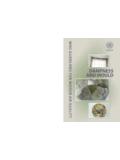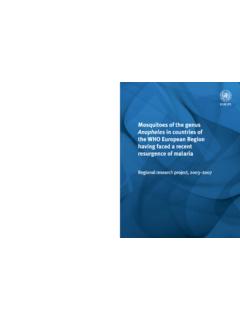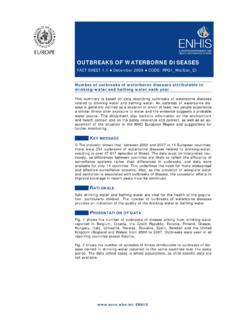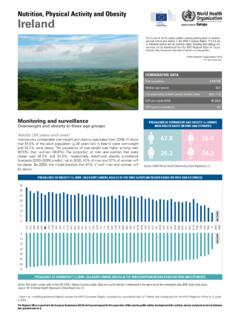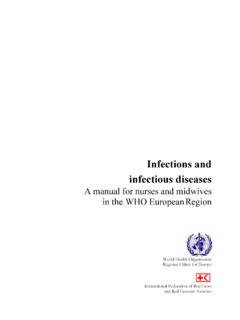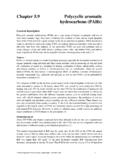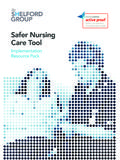Transcription of The Health Care Workforce in Europe - …
1 Edited byBernd RechelCarl-Ardy DuboisMartin McKeeon Health Systems and PoliciesEuropeanThe Health CareWorkforce in EuropeLearning from experienceThe Health care Workforce in EuropeLearning from experienceThe European Observatory on Health Systems and Policies supports and promotes evidence-based Health policy-making through comprehensive and rigorous analysis of Health care systemsin Europe . It brings together a wide range of policy-makers, academics and practitioners toanalyse trends in Health care reform, drawing on experience from across Europe to illuminatepolicy European Observatory on Health Systems and Policies is a partnership between the WorldHealth Organization Regional Office for Europe , the Governments of Belgium, Finland,Greece, Norway, Spain and Sweden, the Veneto Region of Italy, the European Investment Bank,the Open Society Institute, the World Bank, CRP-Sant Luxembourg, the London School ofEconomics and Political Science and the London School of Hygiene & Tropical Health care Workforce in EuropeLearning from experienceEdited byBernd RechelResearch Fellow, London School of Hygiene & Tropical Medicine, United KingdomCarl-Ardy DuboisAssistant Professor.
2 Department of Nursing Sciences, University of Montreal,CanadaMartin McKeeProfessor of European Public Health , London School of Hygiene & TropicalMedicine, and Research Director, European Observatory on Health Systems andPolicies, London, United KingdomKeywords: Health OCCUPATIONS trendsHEALTH MANPOWER trendsDELIVERY OF Health CARECOMPARATIVE STUDYFRANCEGERMANYLITHUANIAMALTANORWAYPO LANDRUSSIAN FEDERATIONSPAINUNITED KINGDOMEUROPE World Health Organization 2006, on behalf of the European Observatory on Health Systems andPoliciesAll rights reserved. The European Observatory on Health Systems and Policies welcomes requests for permission to reproduce or translate its publications, in part or in views expressed by authors or editors do not necessarily represent the decisions or the stated policies ofthe European Observatory on Health Systems and Policies or any of its partners.
3 The designations employed and the presentation of the material in this publication do not imply the expressionof any opinion whatsoever on the part of the European Observatory on Health Systems and Policies or anyof its partners concerning the legal status of any country, territory, city or area or of its authorities, or concerning the delimitation of its frontiers or boundaries. Where the designation country or area appearsin the headings of tables, it covers countries, territories, cities, or areas. Dotted lines on maps representapproximate border lines for which there may not yet be full mention of specific companies or of certain manufacturers products does not imply that they areendorsed or recommended by the European Observatory on Health Systems and Policies in preference toothers of a similar nature that are not mentioned.
4 Errors and omissions excepted, the names of proprietaryproducts are distinguished by initial capital European Observatory on Health Systems and Policies does not warrant that the information containedin this publication is complete and correct and shall not be liable for any damages incurred as a result of 92-890-2297-3 Printed and bound in the United Kingdom by The Cromwell Press, Trowbridge, address requests to: Publications, WHO Regional Office for Europe , Scherfigsvej 8, DK-2100 Copenhagen , DenmarkAlternatively, complete an online request form for documentation, Health information, or for permissionto quote or translate, on the WHO/ Europe web site at of tables, figures and boxesviAbout the authorsviiForewordixAcknowledgementsxi1 Introduction: Critical challenges facing the Health care Workforce in Europe1 Carl-Ardy Dubois, Martin McKee, Bernd Rechel2 France19 Suzanne Wait3 Germany33 Susanne Weinbrenner, Reinhard Busse4 Lithuania47 Zilvinas Padaiga, Liudvika Starkiene, Zeneta Logminiene, Jack Reamy5 Malta59 Natasha Azzopardi Muscat, Kenneth Grech6 Norway71 Are-Harald Brenne7 Poland87 Monika Str zik8 Russian Federation101 Kirill Danishevski9 Spain115 Beatriz Gonz lez L pez-Valc rcel, Carmen Delia D vila Quintana, Elena Rodr guez Socorro10 United Kingdom129 James Buchan, Alan MaynardIndex143 Tables, figures and boxesTablesTable of human resources in the French health22care system (1998 2002)Table of Health care resources in the French health22care system (1998 2002)
5 Table of women according to medical specialization23and setting of careTable professionals 1991 2003 (per 100 000 population)36 Table Workforce 1997 2002 (full-time equivalent, 38in thousands)Table professionals 1990 2002 (full-time equivalent)72 Table in numbers qualifying as Health professionals, 721990 2002 Table of Health care professionals in Poland per 891000 populationTable of professional associations in Spain, 1985 2000117 Table of NHS staff by selected occupation, NHS England, 1321999 and 2002 (headcount)Table of general practitioners per 1000 population133 Table of medical and dental staff in hospitals per 1000 133populationTable time equivalent in the NHS qualified nursing and 133midwifery Workforce , 1999 2002 Table of qualified nurses and midwives, NHS England, 1351999 and 2002 (headcount)FiguresFigure to the UKCC Register from EU Directive/non-EU 134sources.
6 1993/1994 2001/2002 (initial registrations)BoxesBox Plan targets131 About the authorsNatasha Azzopardi Muscatis Director, EU and International Affairs,Ministry of Health , Malta, and Coordinator, Health Services ManagementDivision, Institute of Health care , University of Malta, G Mangia, Brenne is a Master s student at the Department of Economics,University of Bergen, Buchan is Professor in the Faculty of Social Sciences and HealthCare, Queen Margaret University College, Edinburgh, United Busse is Professor and Head of the Department of Health CareManagement at the Technical University of Berlin, and Associate ResearchDirector of the European Observatory on Health Systems and Policies,Berlin, Danishevski is Research Fellow at the London School of Hygiene &Tropical Medicine, and Coordinator of Health System Development ResearchProgrammes in the Russian Federation.
7 He is also Assistant Lecturer in theSchool of Public Health and Health Management (postgraduate),Department of Public Health and Public Health Consultant, Open HealthInstitute, Moscow, Russian Delia D vila Quintana is Professor in the Department ofQuantitative Methods for Economics and Management, University of LasPalmas de GC, Dubois is Assistant Professor in the Faculty of Nursing Sciences,University of Montreal, Gonz lez L pez-Valc rcel is Professor in the Department ofQuantitative Methods for Economics and Management, University of LasPalmas de GC, Grech is Assistant Lecturer in Health Services Management, andHonorary Clinical Lecturer in Public Health in the Faculty of Medicine andSurgery, University of Malta, Logminiene is Deputy in the Department of Expertise and Audit atthe Vilnius Territorial Sickness Fund.
8 McKee is Professor of European Public Health at the LondonSchool of Hygiene & Tropical Medicine, and Research Director of theEuropean Observatory on Health Systems and Policies, United Maynard is Professor of Health Economics in the Department ofHealth Sciences, University of York, United Padaiga is Vice Rector for Studies and Professor of PreventiveMedicine in the Faculty of Public Health , Department of PreventiveMedicine, University of Medicine in Kaunas, Reamy is Associate Professor at the Department of Health ServicesAdministration at Xavier University, United Rechel is Research Fellow at the London School of Hygiene &Tropical Medicine, United Rodr guez Socorrois Lecturer in the Department of QuantitativeMethods for Economics and Management, University of Las Palmas de GC,SpainLiudvika Starkiene is Adviser to the Minister in the Lithuanian Ministry ofHealth, Vilnius, Str zik is Administration Supervisor for KPMG, Wait is an independent Health policy consultant, and Director ofSHW Health Ltd.
9 She is also Honorary Senior Research Fellow at UCL andDirector of Research at the International Longevity Centre-UK, London,United Weinbrenner is Senior Research Fellow at the Department ofHealth care Management, Institute for Public Health , Faculty of Economicsand Management, Technical University of Berlin, Germany. About the authorsviii ForewordHealth care is changing. Ageing populations, new therapeutic possibilities and rising expectations have made the provision of Health care much morecomplex than in the past. Many countries are responding to this challenge,introducing new ways of delivering Health care . At the heart of these changesare the Health professionals. They must acquire a range of new skills. Some aretechnical, such as how to get the most from new information systems oradvances in technology.
10 Some are organizational, such as how to work inmulti-disciplinary teams. Yet the new landscape requires more than this. It alsodemands new attitudes, finding ways in which the Health professional can engagein effective partnerships with both their patients and the organizations thatpurchase care on their behalf and who look beyond the individual patients tounderstand the needs of the population. These changes are taking place at a time of considerable environmental turbulence. This is exemplified by patterns of professional migration. Long-established movements, such as those between the Indian sub-continent andthe United Kingdom, are slowing down in the face of new immigration the same time, there is increasing movement from the countries of centraland eastern Europe that joined the European Union in 2004.
